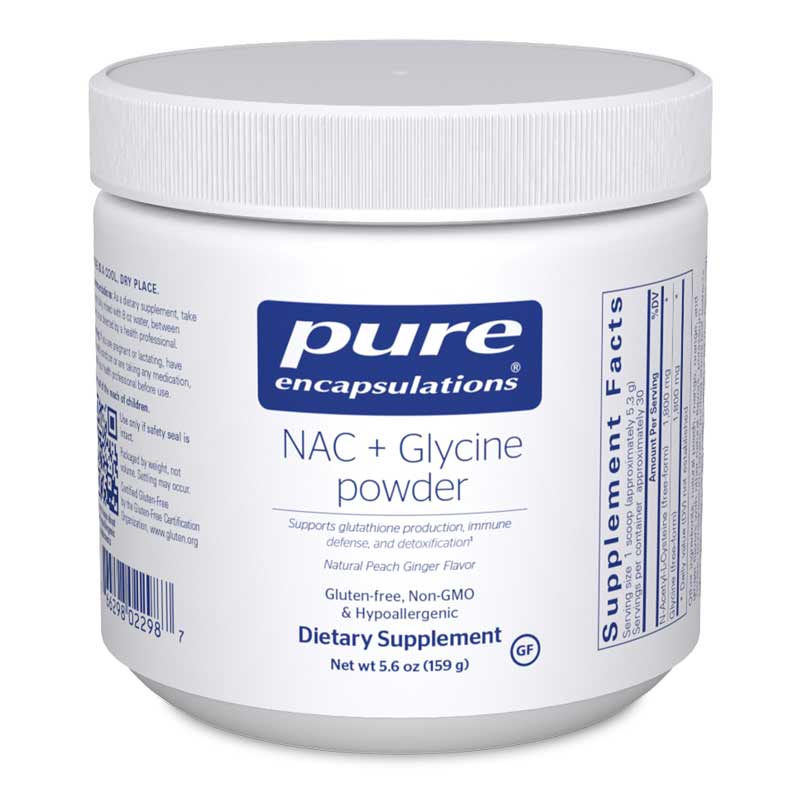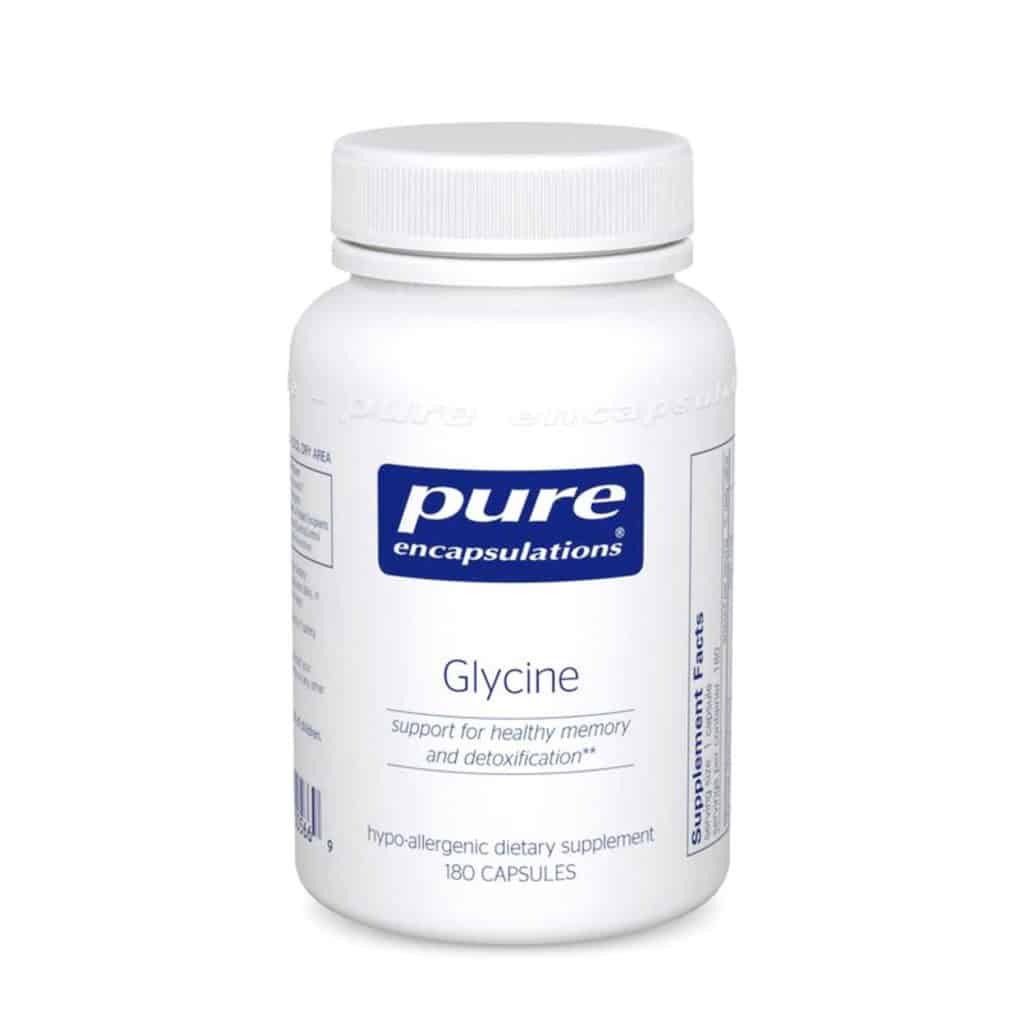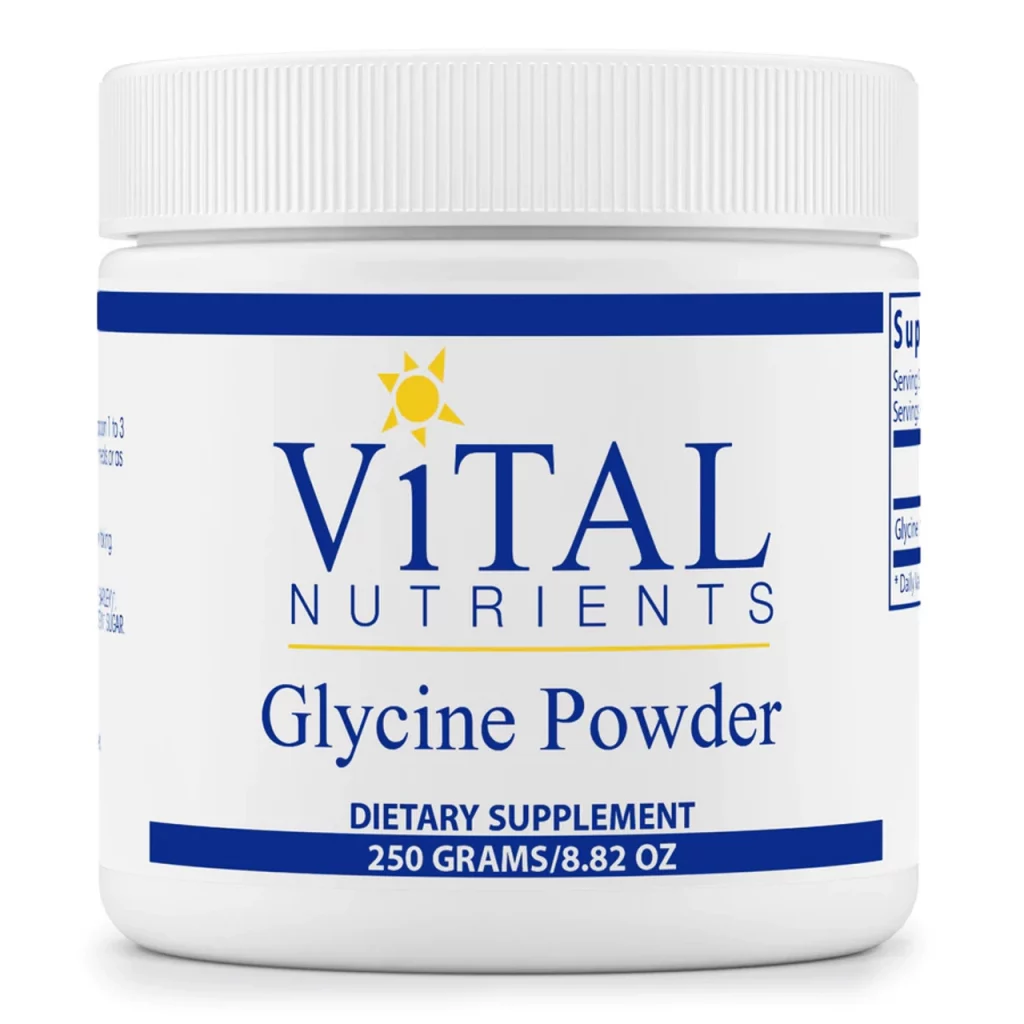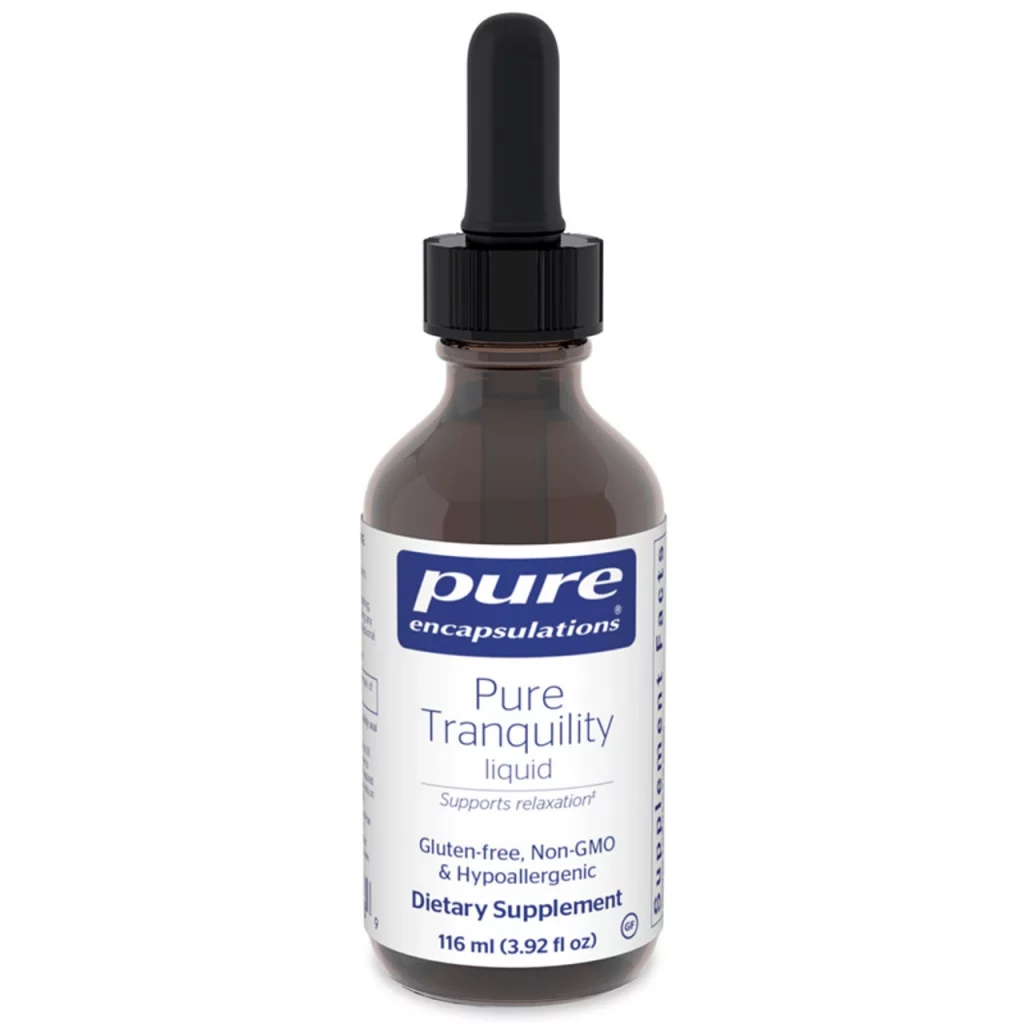Last updated on September 14th, 2022 at 12:59 pm
Before we talk about the best glycine supplement if that’s something your body needs let’s understand more about glycine. Glycine is an amino acid that our bodies and all other living beings produce, from the smallest microbe to the tallest tree. We all carry the same 20 types of amino acids, making up 20 percent of our body or 50 percent of our solid mass(1).
Essentially, amino acids are the building blocks of proteins. All the proteins within our body are made up of different combinations of the 20 amino acids. Of these 20, 9 are essential amino acids, which means they cannot be produced in our bodies. We must get them through the food we consume.
The other 11 are considered non-essential amino acids. They can be produced from other amino acids within our body. Glycine fits into the non-essential category. It works with other amino acids to regulate the body, can become enzymes and hormones when needed, and helps provide energy to the body.
In this post, we will answer all your burning questions about glycine, from the many benefits it has for our body and mind, specific ways it can help treat ailments, and some great supplement options for those looking to give their glycine levels a boost. Let’s begin with how glycine affects our bodies.
How Does Glycine Affect the Body
As was mentioned above, amino acids are the building blocks of many proteins. Glycine, in particular, is a large part of collagen. Collagen is found in many parts of the body, from our muscles to our skin, ligaments, cartilage, and bones (2).
If one does not have enough glycine, the production of collagen may suffer. Beyond collagen, glycine helps the body eliminate toxins within the body by binding to them and helps to regulate nerve impulses within the central nervous system.
What is Glycine Good For?
Now that we know how glycine affects the body, we can take a deeper look at how it can help our bodies in other ways. We’ll address the many questions that the curious-minded often have about this amazing amino acid one by one.
Does Glycine Help Memory?

If you find yourself feeling forgetful these days, there is some good news. Glycine has been studied and shown to improve memory recall (3). Essentially glycine binds to the receptor, an integral part of learning and memory. This receptor is called N-Methyl-D-aspartate (NMDA).
As glycine binds to it, it increases its function and is believed to improve the memory and learning faculties of those who took a glycine supplement. It’s important to note that glycine works to enhance memory, rather than focus as caffeine does.
Does Glycine Increase Serotonin?
Although more research is required, in one study (4) results were positive and it is believed that glycine, when given orally, may help those with insomnia or trouble sleeping, as it can increase the levels of serotonin.
As glycine is needed to produce serotonin, and serotonin, in turn, is needed to make the sleep hormone melatonin, then it is strongly suggested that if you suffer from sleep difficulties, you look at your glycine levels.
It is also believed that glycine can help improve a person’s mood. This is because serotonin is otherwise known as a mood booster or the ‘feel-good hormone’. It stands to reason that if your levels of serotonin are where they should be, your mood will be elevated.
What’s The Role of Glycine in The Brain?

We mentioned that glycine helps to regulate nerve impulses within the central nervous system, so, let’s elaborate on that. Glycine receptors (GlyRs) are present in our brains even when developing in the embryonic stage, particularly during spinal cord development (5).
As adults, beyond our cognition and sleep habits mentioned above, these receptors are involved in pain perception, motor control, appetite and digestion, and even our immune function. They can inhibit and stimulate cells in the brain and central nervous system.
This is because glycine has a hand in the production of other biochemicals that impact these body functions. It is also one of the three amino acids needed to create creatine. Creatine is the backup energy for our brain’s neurons when normal energy supplies from glucose and oxygen begin to run low. In short, it helps for overall better brain function (6).
Does Glycine Help with Anxiety?
This depends on whether we are talking about anxiety or chronic anxiety. Currently, signs point to a promising yes when talking about feeling anxious about something or having a panic attack. This is because if you experience a panic attack or anxiety, norepinephrine (NE) is released into the body.
Glycine works as an antagonist to NE, fighting it off and helping to reduce feelings of anxiety or anxiousness (7). If you are looking for fast action, consider taking an oral supplement sublingually, that is, under your tongue. This will help to bypass your gastrointestinal tract and to absorb more quickly in your body (8).
Does Glycine Help with Anti-Aging?

Here’s what we know. First, glycine is integral in producing collagen. Collagen works hard to our joints lubricated but also works to fight skin from aging; it can smooth out wrinkles and maintain skin’s elasticity (9). Thus, we can argue that glycine can help with anti-aging.
Next, low levels of serotonin can interfere with our sleep. Lack of sleep can cause us to age more quickly (10). Glycine is necessary for us to produce serotonin and melatonin, helping us get the necessary sleep we need.
Lastly, discussions have become hot on the belief that glycine can treat fibroblasts in the elderly, preventing these phenotypes from aging. This could mean glycine could be used as a future treatment to reverse signs of aging, but more research and time will provide a clearer picture.
Does Glycine Help with Inflammation?
Yet another glycine benefit. Yes, many recognize the benefits that glycine can help with inflammation since collagen when taken in supplement form can help reduce inflammation and joint pain(11). If you are looking to increase your collagen intake, below are a few suggested collagen supplements.
Nutridyn Dynamic Collagen Renew
This collagen supplement goes beyond healthy nails, hair, and skin but also promotes healthy joints and bones. It also has glycine as one of its ingredients, so it’s a real win-win if you are looking to increase both collagen and glycine.
If you prefer to take your collagen in tablet form, then you may like Metagenics version that also includes glycine as one of the ingredients. This supplement focuses on overall optimal health in this all-natural formula and will work to have your joints feeling younger with less inflammation.
It’s also worth noting that if you suffer from heart disease or are a prime candidate for developing a heart condition, glycine may help to reduce inflammation within the organ and surrounding areas. Because it works as an antioxidant, it can also help to repair damaged cells (12).
What Causes Glycine Deficiency?
Since glycine is a non-essential amino acid, if your body is unable to produce enough glycine, it may mean that you aren’t getting enough of the essential amino acids from your diet. This means you should re-evaluate what you are eating to ensure that it is overall balanced to include a wide variety of nutrient-dense food.
The Best Glycine Supplements
If you suspect that you suffer from any of the above conditions, poor memory, insomnia, anxiety, or maybe you want to see if it will help with your sore joints or aging woes, you may want to buy a glycine supplement to see if you can gain any improvement.
Before you introduce glycine supplementation, however, it is advisable to discuss your personal needs with your doctor first. Once you get the go-ahead, here are some of the best glycine supplement brands you may want to consider.
Pure Encapsulations NAC Plus Glycine Powder
This is our top pick for the best glycine supplement because it not only contains an appropriate amount of glycine but it works synergistically with NAC to support many of your body’s systems. It works to support your immune defense, respiratory health, and detoxification. We love that it is made with non-GMO ingredients, is hypoallergenic, gluten-free, and vegan. It also helps to restore glutathione synthesis, an antioxidant that works to reduce oxidative stress.
Glycine Capsules – Pure Encapsulations Glycine Capsules
These glycine capsules make it easy to support your overall health, including the potential to improve your memory and mental function and slow down the aging process. It also has been strongly connected with supporting healthy liver and kidney function through the detoxification of certain chemicals.
Vital Nutrients Glycine Powder
Another glycine powder, this one from Vital Nutrients, recognizes the potential for glycine supplements to aid in stress management and support neural development and maintain strong mental faculties. Try taking your dose before bed to improve sleep quality and increase levels of serotonin.
Pure Tranquility Liquid – Pure Encapsulations
To balance out your options, Pure Encapsulations offers glycine in liquid form. Not only is the liquid easy to add to water, but it also tastes great. It promotes a feeling of relaxation, may combat feelings of anxiety, and can lead to a better night’s sleep. Blended with GABA and l-theanine, stress will be a faint memory after you include this supplement in your daily routine.
Is it Safe to Take Glycine Every Day?
Provided you have talked with your doctor first, we see no reason you cannot take glycine every day. That said, your health practitioner will better know your health history and can adjust your dosage to what your body needs.
What Time of Day Should You Take Glycine?
Sometimes, the time of day you take a supplement can make a big impact on how it makes you feel. Certain nutritional supplements are better to take in the morning, such as vitamin B, because it gives you energy and helps with nutrient metabolism.
If you intend to use glycine as a sleep aid, then taking it an hour or two before bed is suggested (13). That said, you may be taking glycine for a different purpose, such as when you feel anxious. In that case, taking it sublingually when you need to feel calm quickly might give you the dose you need, but always talk to your doctor first.
What Foods are High in Glycine?

Some prefer changing their diet to include foods with higher levels of the needed nutrients they are missing. If you are looking to increase your glycine intake, here is a list of glycine-rich foods you may want to add to your diet (14).
- Red meat: (1.5 to 2 g per 100 g serving)
- Seeds (1.5 to 3.4 g per 100 g)
- Turkey (1.8 g per 100 g)
- Chicken (1.75 g per 100 g)
- Pork (1.7 g per 100 g)
- Peanuts (1.6 g per 100 g)
- Canned salmon (1.4 g per 100 g)
- Granola (0.8 g per 100 g)
Fun Facts About Glycine
- Amino acids are instrumental in how food tastes. Every amino acid has its own taste; glycine has a sweet taste. This makes it easy to incorporate into foods when added as a supplement in powdered form.
- Glycine is said to promote better muscle growth, something which can aid those who suffer from Sarcopenia, a condition of age-associated muscle degeneration.
- Glycine can be taken by those who are in recovery, either from surgery or an illness, to help their bodies heal more quickly.
- Glycine may aid in protecting your liver from alcohol-induced damage.
There is no question that even if glycine is considered a non-essential amino acid, it is essential to maintain optimal health. Glycine benefits our sleep, our mood, our joints, and our memory. It promotes healthy muscle mass, might slow down the aging process, and can even aid with anxiety.
And while a healthy balanced diet can aid in ensuring we don’t become glycine deficient, sometimes, it isn’t enough. If you believe that taking glycine supplementation could benefit your lifestyle, talk to your doctor about the potential benefits of adding glycine to your diet.
Sources:
- What are Amino Acids? | Amino Acids | About the Ajinomoto Group | Ajinomoto Group Global Website – Eat Well, Live Well.
- Glycine: Uses, Benefits, Side Effects, Dosage, Precautions (verywellhealth.com)
- https://pubmed.ncbi.nlm.nih.gov/10587285/
- Oral administration of glycine increases extracellular serotonin but not dopamine in the prefrontal cortex of rats – PubMed (nih.gov)
- Frontiers | Glycine receptors and brain development (frontiersin.org)
- Glycine helps with anxiety, sleep, and thinking… (justinbethoneynp.com)
- Nutritional treatments to combat anxiety disorders – Hospital News
- Calming Anxiety, Depression & Insomnia: An Integrative Medicine Approach (hearthsidemedicine.com)
- Collagen Supplements for Aging and Wrinkles: A Paradigm Shift in the Fields of Dermatology and Cosmetics – PMC (nih.gov)
- Partial sleep deprivation linked to biological aging in older adults – American Academy of Sleep Medicine – Association for Sleep Clinicians and Researchers (aasm.org)
- Health Benefits of Collagen: Pros, Cons, and More (healthline.com)
- Glycine: Uses, Benefits, Side Effects, Dosage, Precautions (verywellhealth.com)
- What is Glycine and What Does It Do | Metabolic Maintenance
- Glycine: Uses, Benefits, Side Effects, Dosage, Precautions (verywellhealth.com)
- Magnesium Threonate: An Honest Buying Guide for Health Enthusiasts - March 21, 2024
- Magnesium Citrate Vs Glycinate: 5 Key Differences And Benefits - March 14, 2024
- How to Pick the Best Magnesium Glycinate Supplement for You - March 7, 2024








